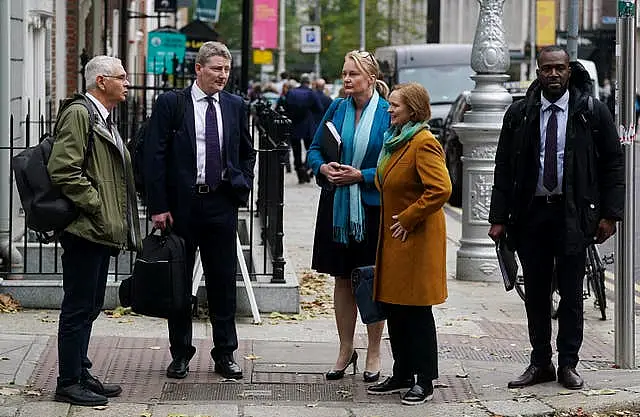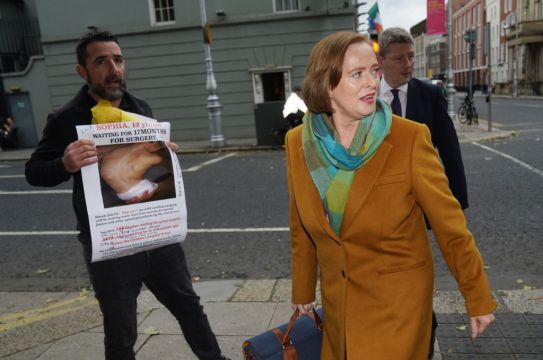The CEO of Children’s Health Ireland (CHI) has said she has “absolutely no recollection” of discussing the use of non-medical springs in surgeries with any clinician.
The hospital group is at the centre of a controversy around post-operative outcomes for children with serious spinal conditions, including the use of springs in some surgeries.
Eilish Hardiman told members of the Oireachtas Joint Committee on Health that she did not receive correspondence discussing the use of the springs which was purportedly sent following a meeting in February 2020.
Ms Hardiman told the members that implanting non-medical grade devices should not happen and cannot be approved by anybody within CHI or the Health Products Regulatory Authority.
She said there was a full end-to-end investigation into the custody of the springs through the hospital organisation.
She said the springs were not from an approved supplier and did not enter the hospital through the approved procurement process.

Ms Hardiman told Sinn Féin health spokesperson David Cullinane: “We have evidence of it being invoiced, but that doesn’t mean it’s been procured.”
Clinical director Paula Kelly said the the implantation of non-medical devices is “not appropriate in any situation in the surgical world”.
She added: “We cannot stand over any surgeon who implants non-medical devices.”
Asked by Green Party TD Neasa Hourigan about how the springs entered the surgical theatre, CHI’s chief medical officer, Dr Allan Goldman, said: “We’re at as perplexed as you as to how that happened.”
Asked by Mr Cullinane if she had attended a meeting in 2020 in which experimental techniques and devices were discussed with clinicians including the surgeon at the centre of the reviews, Ms Hardiman said she was at the meeting but had no recollection of the springs being discussed.
She said: “I have absolutely no recollection of that.”

The CHI chief said the use of “MAGEC rods”, which are separate instruments, was discussed at the meeting.
Asked about the correspondence addressed to her which raised the use of springs, Ms Hardiman said: “I have not received this letter. I have no evidence of receiving this letter and I have absolutely not approved non-medical devices.”
She said she first became aware of the use of springs in child surgeries in July 2023 following parliamentary questions from People Before Profit TD Paul Murphy.
Ms Hardiman said that discussions on new techniques happen “all the time” but reiterated that approval would have to be given for the implantation of any device.
She also said: “This particular treatment was actually first under a research study in Utrecht Children’s Hospital, and that went through the full research ethics process.
“The device that was actually used there was a medical-grade device and it went through all of the proper processes as a proper piece of research.”
In her opening statement, Ms Hardiman said the findings of reviews in the paediatric orthopaedic services were “distressing” as she apologised again to affected individuals and families.
She said children did not receive the level of care which they deserved and were entitled to.
“We are deeply sorry that the children, young people and families did not get the care they deserve and apologise unreservedly for the harm that they endured.”
One of the children whose case was included in the reviews has died.
Ms Hardiman apologised to their family and said the case is subject to a serious incident investigation.
“We want to offer our sympathies and profound apologies to the family involved.”
She committed to providing the family with the incident review report as soon as it is completed.
“Things happened in CHI Temple Street that should not have happened. Decisions were made, certain procedures were carried out, children were subjected to a higher than expected unplanned return trips to the theatre and, alarmingly, unapproved non-medical grade devices were implanted in three children.
“This is a shocking litany of events.”
She added: “As soon as we become aware the outcomes of these surgeries were not what they should have been, we acted.”
Mr Cullinane read from email correspondence in which the clinical director of Temple Street hospital asked the surgeon at the centre of the reviews.
He said the consultant was asked to “do three-to-four” operations per month, “rather than your proposed one a month”.
Responding to a question from Mr Cullinane, Ms Hardiman rejected that there was a possibility that pressure was placed on clinicians to perform surgeries at an increased rate that was unsafe.







